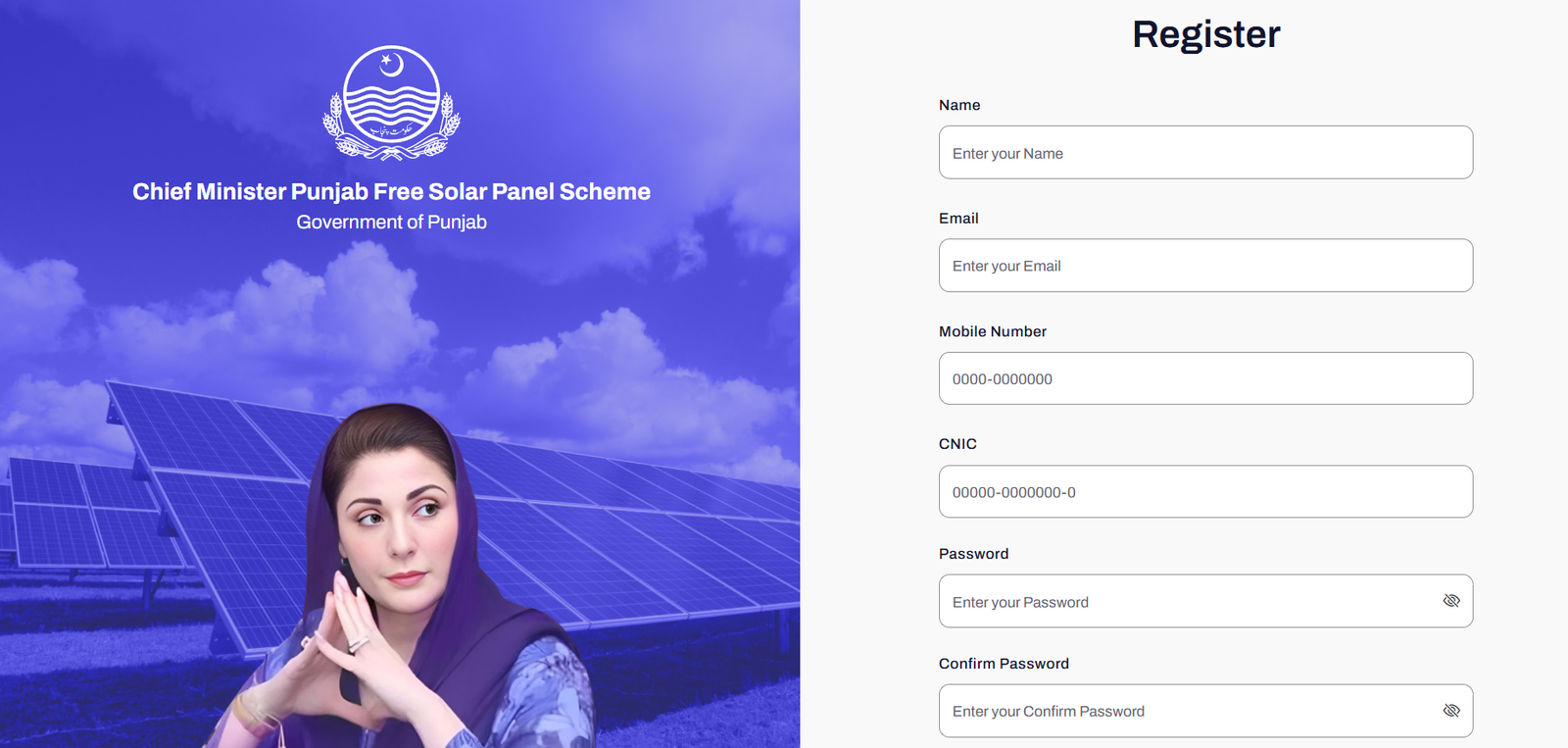Punjab Chief Minister Maryam Nawaz Sharif has launched the CM Punjab Free Solar Panel Scheme to help reduce electricity expenses for low-income households. Announced during a formal ceremony on Friday, the initiative aims to provide free solar systems to 100,000 households with low electricity consumption across the province. This project is expected to bring long-term relief to families while promoting sustainable energy solutions.
Below is a detailed guide on how to apply, eligibility criteria, and the benefits of this Solar Scheme program.

Key Highlights of the Roshan Gharana Programme
The Punjab Government Solar Panel Scheme is a significant step towards sustainable energy and financial relief for many families. By participating, eligible households can reduce their electricity costs and contribute to a greener environment.
- Eligibility: Households consuming between 50 to 500 units of electricity.
- Government Contribution: 90% of the cost.
- Consumer Contribution: 10% of the cost.
Solar Scheme Latest News
Statement from CM Punjab Maryam Nawaz

“The government will not leave the public alone in difficult times. We aim to mitigate the effects of past destruction and ensure that the public does not face such issues in the future,” said CM Maryam Nawaz.
Application Process for the Free Solar Panel Scheme
Applying for the scheme is simple and can be done online or via SMS. Follow these steps:
How to Apply Online
- Visit the official website: cmsolarscheme.punjab.gov.pk.
- Enter your electricity bill reference number and CNIC number for verification.
- Submit your application.
How to Apply via SMS
- Send your electricity bill reference number and CNIC number to 8800.
- Wait for a confirmation message regarding your application status.
Selection Process
- Applications will go through a verification process based on the electricity bill reference and CNIC numbers.
- A computerized ballot system will ensure transparency in selecting beneficiaries.
Details of Solar System Distribution
The solar panels will be distributed based on monthly electricity consumption:
| Monthly Electricity Usage | Solar System Capacity | Households Benefited |
|---|---|---|
| Up to 100 units | 550 watts | 52,019 households |
| Up to 200 units | 1,100 watts | Remaining applicants |
Rollout Timeline
The entire scheme will be implemented over a period of one year to ensure a smooth and transparent process.
| Aspect | Details |
|---|---|
| Scheme Name | Roshan Gharana Programme |
| Eligibility | Households consuming 50 to 500 units of electricity |
| Government Contribution | 90% of the cost |
| Consumer Contribution | 10% of the cost |
| Registration Methods | SMS (8800), Website, Bank of Punjab |
| Priority | The remaining 10% will be paid over five years via the electricity bill |
| Installation Period | September and October |
| Payment Method | The remaining 10% paid over five years via the electricity bill |
Eligibility Criteria for the Punjab Solar Panel Scheme
- Domestic consumers having monthly consumption of up to 200 units under the following categories are eligible:
- Up to – 50 Units (Life Line)
- 51-100 Units (Life Line)
- 0-100 Units (Protected)
- 0-100 Units (Un-protected)
- 101-200 Units (Protected)
- 101-200 Units (Unprotected)
- Eligibility of domestic consumers will be based on bills for the month of June 2024.
- Consumers with a sanction load of up to 2 KW will be eligible.
- Via Web Portal: cmsolarscheme.punjab.gov.pk
- Via SMS: “Reference-No. CNIC to 8800.”
Registration Process for Punjab Free Solar Scheme
Eligible families can register through various methods:
- SMS Registration: Send your bill reference number and CNIC to 8800.
- Website Registration: Apply through the official government website.
- Bank of Punjab: Visit any branch to apply.
Once registered, you will receive a notification about the status of your application.
Installation and Payment
- Phase I: At least 450,000 families will receive solar panels.
- Notification: Selected families will be informed about their status.
- Payment: The remaining 10% cost will be paid over five years via the electricity bill.
- Installation Period: September and October.
Priority and Capacity
- Priority: The poorest families will be prioritized in Phase I.
- System Capacity: The capacity will be determined based on the user’s needs, balancing between government-provided electricity and solar power.
Who is eligible for the solar panel scheme?
Households consuming between 50 to 500 units of electricity per month are eligible, provided they meet other criteria such as being a Pakistani citizen and having a valid CNIC.
How do I apply for the Solar scheme?
You can apply by sending your bill reference number and CNIC to 8800 via SMS, through the official website, or by visiting any Bank of Punjab branch.
How much do I need to pay for the solar panels Scheme?
The Punjab government will cover 90% of the cost, and you will need to pay the remaining 10%.
What is the Last date to apply for the Solar Scheme in Punjab?
5th January 2025, is the last date to apply for CM Solar scheme Punjab
Conclusion
The Punjab Government Solar Panel Scheme, through the Roshan Gharana programme, represents a significant effort towards promoting sustainable energy and providing financial relief to families. By covering 90% of the cost of solar panels, the government ensures that even the poorest households can benefit from renewable energy. This initiative not only helps in reducing electricity costs but also contributes to a greener and more sustainable future. Families that qualify should take advantage of this opportunity to enhance their energy independence and reduce their carbon footprint.











![Calculate Solar Panels Needed for 1.5 Ton and 1 Ton AC [Comprehensive Guide]](https://solarscheme.pk/wp-content/uploads/2024/08/maxresdefault-2024-08-08T115842.229.jpg)


